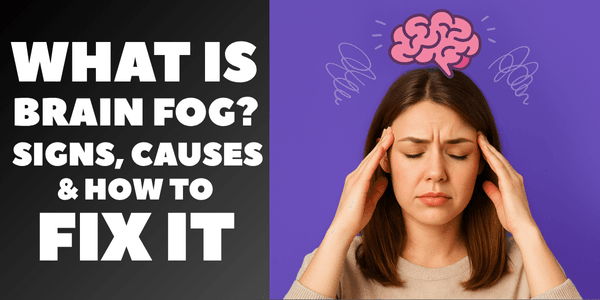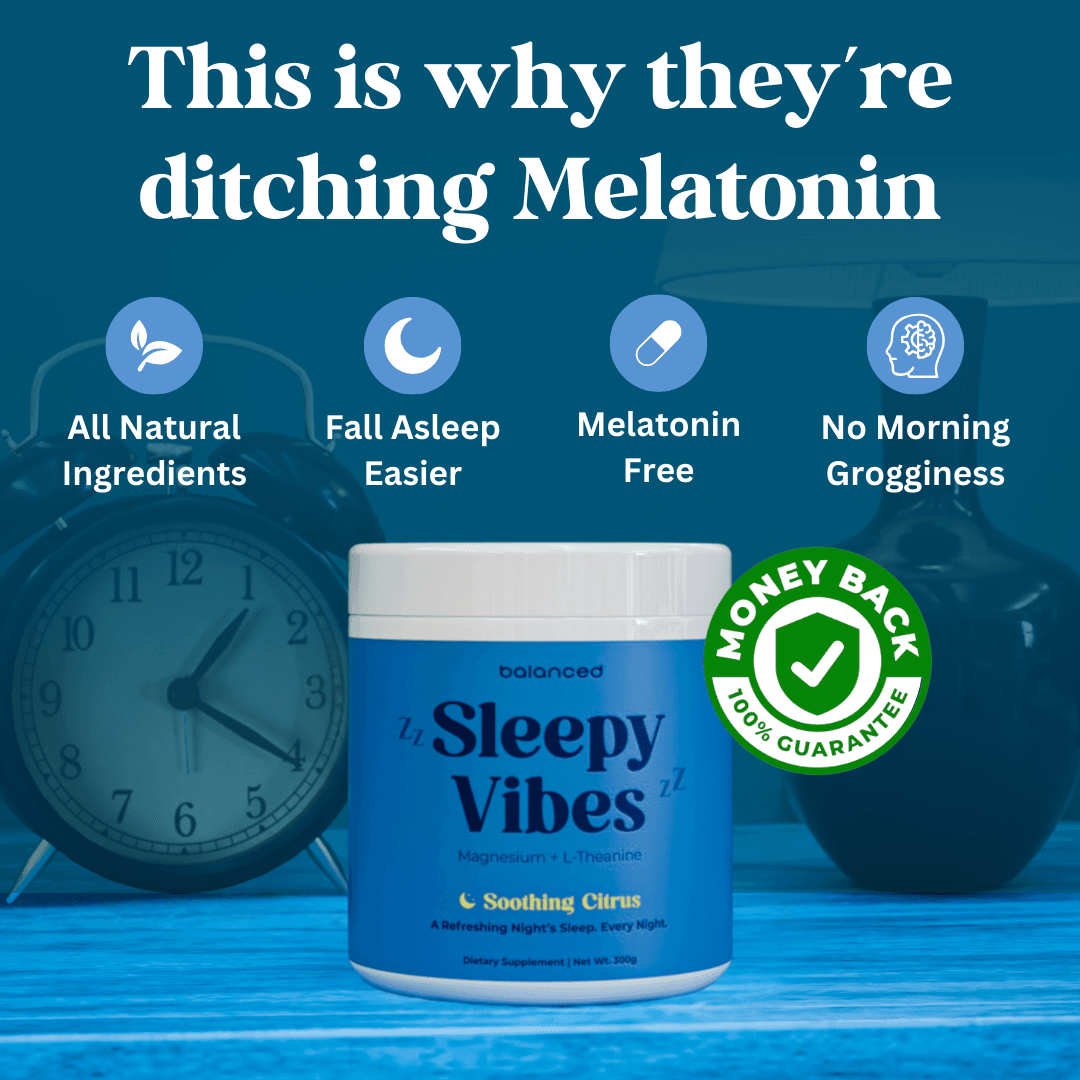
Can’t remember why you walked into the room?
Struggling to stay focused at work, even after a whole night’s sleep?
If you’re nodding your head, you’re not alone.
Brain fog isn’t just forgetfulness; it’s a signal that your body is off balance.
And no, it’s not “just aging” or “stress.”
Most cases of brain fog have particular, fixable causes.
In this article, we’ll uncover the 7 causes of brain fog and show you exactly how to fix each one using safe, natural strategies.
What Exactly Is Brain Fog?
Brain fog isn’t a disease; it’s a symptom.
A signal. It’s your brain saying: “Something’s not right here.”
It often shows up as:
-
Poor focus or concentration
-
Forgetting words or appointments
-
Feeling “off” or mentally sluggish
-
Trouble processing information or multitasking
You might look fine on the outside, but inside you feel… foggy.
But the good news is that most causes of brain fog are reversible.
7 Causes of Brain Fog (And How to Fix Each One Naturally)
1. Poor Sleep Quality
This is the Fastest Way to Cloud Your Mind.
Sleep isn’t just rest, it’s when your brain cleans itself.
During deep sleep, your brain flushes out toxins, repairs cells, and stores memories.
If your sleep is fragmented or too short, your brain never gets the chance to complete this crucial cleanup.
Fix It Naturally:
-
Set a sleep schedule: Aim for 7 to 9 hours of sleep every night, including weekends.
-
Avoid screens for 90 minutes before bed: Blue light can block melatonin production.
-
Use a sleep ritual: read, stretch, or drink herbal tea, such as chamomile or lemon balm.
-
Optimize your room: Keep it dark, cool (65°F is ideal), and quiet.
Tip: Waking up groggy despite 8 hours?
Rule out sleep apnea, a common yet often overlooked cause of poor sleep quality.

2. Nutritional Deficiencies
Your brain is a nutrient hog. It needs specific vitamins, minerals, and fats to function.
Without them, you may experience confusion, slow thinking, or even mood swings.
Top Deficiencies Linked to Brain Fog:
-
Vitamin B12: Supports nerve function and energy.
-
Omega-3 fatty acids: Boost memory and reduce inflammation.
-
Magnesium: Calms the nervous system and helps with sleep.
-
Iron: Delivers oxygen to the brain.
Fix It Naturally:
-
Eat leafy greens, fatty fish (like salmon), eggs, and seeds regularly.
-
Consider a high-quality B-complex or omega-3 supplement (check with your provider).
-
Track symptoms with a food and symptom journal to catch dietary gaps.
Try This: A breakfast of eggs, spinach, and chia-flax yogurt gives your brain a complete nutrient reset.

3. Chronic Stress
When stress becomes chronic, it floods your brain with cortisol.
Over time, this stress hormone shrinks your memory center, disrupts sleep, and burns out your focus.
Fix It Naturally:
-
Practice mindfulness daily: Even 5 minutes of deep breathing or meditation can reduce cortisol levels.
-
Move your body: Walking, yoga, or strength training helps balance stress hormones.
-
Get outside: Sunlight and nature exposure boost serotonin and reduce mental fatigue.
Quick Reset: Pause now.
Take 3 deep, slow belly breaths.
4. Dehydration
Your brain is 75% water.
Even mild dehydration, of about 1 to 2%, can impair memory, focus, and decision-making.
Fix It Naturally:
-
Aim for 8 to 10 cups of water daily (more if active or in hot weather).
-
Start your day with a glass of water before coffee.
-
Add electrolytes or a pinch of sea salt if drinking more water isn’t helping.
-
Eat water-rich foods, such as cucumbers, oranges, watermelon, and celery.
Check-In: If you’re not peeing every 2 to 3 hours, you’re likely underhydrated.
5. A Sedentary Lifestyle
Sitting too long doesn’t just affect your waistline; it reduces oxygen flow to the brain, slows metabolism, and increases inflammation.
Fix It Naturally:
-
Stand and stretch every 30 to 60 minutes.
-
Walk for 10 minutes after meals to improve blood flow and insulin sensitivity.
-
Do 150+ minutes of activity per week: brisk walks, cycling, swimming, or strength training.
-
Try a standing desk or take walking meetings.
Science Fact: Exercise grows new brain cells, especially in the hippocampus, your memory hub.
6. Hormonal Changes
Menopause, thyroid imbalances, pregnancy, and even PMS can cause sharp dips in estrogen, progesterone, or thyroid hormones.
All of which directly affect your brain.
Symptoms to Watch For:
-
Brain fog with hot flashes, night sweats, or mood swings (menopause)
-
Fatigue, dry skin, weight gain (thyroid)
-
Irregular cycles or anxiety (PMS or PCOS)
Fix It Naturally:
-
Eat hormone-balancing foods: flaxseeds, leafy greens, cruciferous veggies, and wild-caught fish.
-
Reduce alcohol and processed sugar, both of which destabilize hormones.
-
Support your liver with detox foods (broccoli, garlic, cilantro).
-
Talk to a provider about natural hormone support options like herbs (maca, ashwagandha).
Reminder: If you experience new symptoms, have your thyroid and hormone levels tested.
7. Underlying Medical Issues
Conditions like hypothyroidism, diabetes, autoimmune disorders, or post-viral fatigue can all create a foggy brain.
Inflammation, hormone imbalances, or poor circulation associated with these diseases can impact mental clarity.
Fix It Naturally (and Safely):
-
Get a comprehensive blood panel that includes thyroid, insulin, inflammation markers, and nutrient levels.
-
Work with a provider to balance medication and lifestyle interventions.
-
Use anti-inflammatory foods, such as turmeric, berries, olive oil, and leafy greens.
-
Practice sleep, stress, and hydration protocols daily.
Real Talk: If your brain fog feels severe or persistent, it’s time to dig deeper.
Don’t settle for “you’re fine”, go for a check.
Additional Factors Contributing to Brain Fog
| Factor | Explanation | Natural Fixes |
|---|---|---|
| Medications | Some medications may impair cognitive function, causing brain fog. | Discuss alternatives with your healthcare provider, focusing on healthy lifestyle changes that support brain health. |
| Excessive Screen Time | Spending long hours in front of screens can lead to cognitive overload. | Introduce the 20-20-20 rule; take regular breaks from screens to refresh your mind. |
| Food Sensitivities or Allergies | Undiagnosed sensitivities can lead to inflammation, contributing to brain fog. | Keep a food diary to track symptoms, and consider an elimination diet under the guidance of a professional to identify potential allergens. |
| Environmental Toxins | Exposure to pollutants and chemicals can hurt brain function. | Use natural cleaning products, filter drinking water, and incorporate detoxifying foods like garlic and cilantro into your diet. |
| Mental Overload | Overcommitting and multitasking can lead to cognitive overload, resulting in fatigue. | Prioritize tasks and set realistic goals; learn to say no; and implement time management techniques, such as the Pomodoro Technique or time blocking. |
Conclusion
Brain fog is frustrating, but it’s also fixable.
When you address the root causes like poor sleep, chronic stress, hidden deficiencies, or hormone shifts, you don’t just “get by,” you get clear.
Every small change you make, such as drinking one glass of water, taking a one-hour evening walk, or having a better breakfast, is a step toward clearer thinking, better memory, and increased energy.
You’re not lazy.
You’re not broken.
Your brain needs better support.
Which brain fog fix will you try today?
Let me know, and follow our page for more guides that help you feel sharp, energized, and in control again.
FAQs About Brain Fog
Is brain fog a sign of something serious?
Brain fog is usually a symptom, not a condition itself. It can stem from stress, poor sleep, hormonal shifts, or nutrient deficiencies. However, if it persists or worsens, it’s essential to rule out serious underlying issues like thyroid dysfunction, autoimmune diseases, or cognitive disorders with a healthcare provider.
Can diet affect brain fog?
Absolutely. Nutrient-dense, anti-inflammatory foods, such as leafy greens, fatty fish, flaxseeds, and berries, support brain health and hormone balance. In contrast, diets high in processed foods, sugar, and refined carbs can contribute to brain fog through inflammation and blood sugar crashes.
How quickly can brain fog go away once addressed?
Some people notice improvement within a few days, especially if dehydration, poor sleep, or stress is the leading cause. Nutritional or hormonal fixes may take weeks, but consistency is key. Track your changes and progress for better clarity over time.
Can hormonal birth control cause brain fog?
Yes. Some women experience brain fog as a side effect of hormonal birth control due to altered estrogen and progesterone levels. If you suspect a connection, consult with your provider about adjusting your method or exploring hormone-friendly alternatives.








































